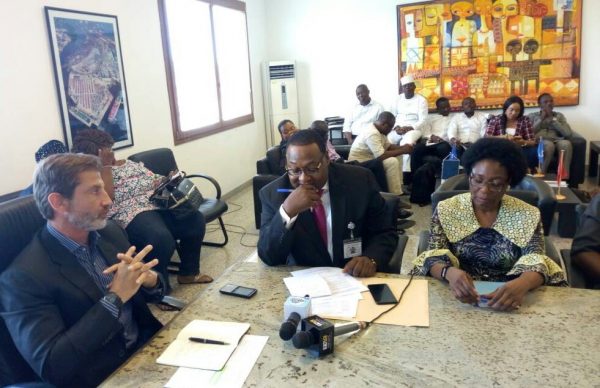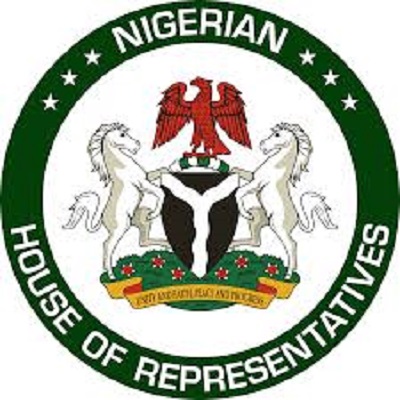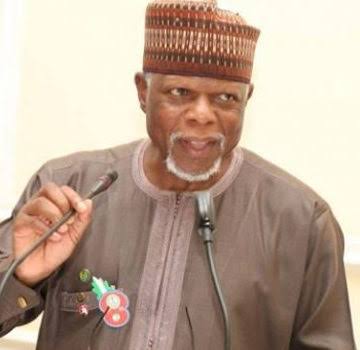Shippers’ Council To Sign MoU With Shipping Companies On Tarrifs, Dispute Resolution

By Kenneth Jukpor
As part of efforts to prevent incessant fracas over arbitrary charges by shipping companies in the country, Nigerian Shippers’ Council (NSC) is set to enter a Memorandum of Understanding (MoU) with shipping companies in Nigeria for proactive deliberations on tariffs and also provide a platform for the port economic regulator to speedily resolve disputes with shipping companies.
The Executive Secretary of the Council, Mr. Hassan Bello revealed this yesterday when the Council went on a working tour to three shipping companies; Maersk line, CMA CGM and Grimaldi Shipping, to engage them on the need to simplify their operations especially to cut the cost incurred by shippers from their services.
Bello highlighted the issue of container deposits and idemnity as one area where shippers have been made to suffer the cost burden on issues that are beyond their control.
The Shippers’ Council boss also lamented that most shippers have complained about the difficulty in getting back their container deposits even after returning the containers as shipping companies later insist on collecting charges for cleaning the containers as well as demanding charges for minor scratches on the containers.
While Hassan Bello demanded that the collection of deposits should be stopped, he argued that the shipping companies should tilt towards paper guarantees rather than container depoits; he also posited that the delay of refund of container deposits has become another fiscal challenge to most Nigerian shippers.
“Nigerian government is very keen to make the nation a place where investments are secured in order to grow the nation’s economy and encourage more foreign as well as indigenous investments. As a regulator, we came to ensure good business ethics, guarantee competition and ensure the ease of doing business in the country is improved so that Nigeria’s rating by the World Bank is better” Bello said.
Bello encouraged the shipping companies to ensure such dialogue is done regularly as it avails the Council the opportunity to know the challenges affecting the companies, even as he admonished them to partner with the government and other port stakeholders to guarantee optimal use of emerging dry ports and truck transit parks across the country.
On his part, the Director, Consumer Service, Central and West Africa, MAERSK LIne, Mr. Razak Ngula stressed the need to have a single automated window where manifests could be easily sent to NPA, NIMASA and Customs.
“Our manifest transmission is seven days but the process of manifest transmissio. has become cumbersome. Today we transmit electronic manisfest several organizations like the Nigerian Ports Authority (NPA), Nigerian Maritime Administration and Safety Agency (NIMASA), Nigerian Customs Service (NCS). In addition, we also print per vessel, twelve hard copies of manifest. Those who receive the electronic manifest also receive hard copies; so we send four hard copies to NPA, three to NIMASA and five to Customs. That’s just for one vessel calling at one port. So, when you take the full rotation of a vessel calling at three ports in Nigeria, that’s a total of thirty-six copies for a vessel. The question is how do we create seamless operations both ways. We have to send these electronic manisfests to four organizations with different platforms. So, MAERSK LAine has to align its systems with four different platforms”
Reponding to the Council’s call for jettisoning the idea of container deposits, Ngula posited that the initiative hasn’t been effective in ensuring containers are returned.
“Over 5,000 customers ship one box each but about 1,600 boxes aren’t returned yet they are expected for the next voyage. The essence of the deposit isn’t to purchase new boxes but to ensure they are returned. You can apply for your refund without coming to the office and the refunds are done wuthin three working days wuth no documentation required. 96% of our shipping instructions at MAERSK Line are done online”, he said.
While MAERSK Line pledged support to guarantee optimal use of TTPs and dry ports in the country, the company lamented that the holding bay policies initiated by NPA hasn’t solved the traffic menace and the demurrage it causes.
According to the organization, no significant incraese has been observed in return of containers to holding bays because agents rather have the containers around the ports to utilize them for other businesses quickly before returning them.
At Grimaldi Shipping, while responding to the issues raised on container deposit, the Managing Director of Grimaldi Agency Nigeria, Mr. Ascannio Russo, denied that his company delays refund of container deposit to shippers on return of the empty containers.
Russo said that the shipper does not need to come to the office to get his refund, adding that company has an arrangement in which the shipper can just make a phone call or send an email to the company and get his refund within four days.
He stated that in effect, the company does not collect container deposits from all of its customers, explaining that those who pay container deposits were importers who are not well structured to be entrusted with empty containers.
Russo expressed concern that clearing of goods in Nigeria was an all comer’s affair, saying this forced his company to register all customs agents doing business with them.
However, at CMA CGM, the Managing Director, Mr. Todd Rives wouldn’t allow Shippers’ Council representatives engage him before the press.







